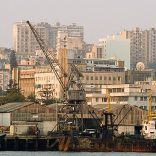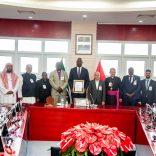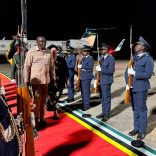Visit by senior Mozambican judge to Israel condemned - AIM report
Mozambique: Parliament moving on election law changes – By Joseph Hanlon

Parliament commission says Council of Ministers proposals unconstitutional
Parliament will debate and approve changes to the municipal election law tomorrow and Thursday (18,19 July) but parts of the proposal by the Council of Ministers (CM) will be rejected. An unusually critical assessment by the 1st Commission of parliament, the Constitutional, Human Rights and Legality Commission (Assuntos Constitucionais, Direitos Humanos e de Legalidade) called some proposals unconstitutional. The 161 page paper was agreed by all parties – Frelimo, Renamo and MDM.
The late Renamo leader Afonso Dhlakama and president Filipe Nyusi reached an agreement on decentralisation, which included replacing direct election of mayors with a system where the head of the list for municipal assembly that receives the most votes automatically becomes mayor. Parliament approved changes to the constitution in May to incorporate the agreement and the Council of Ministers submitted proposed changes to the municipal elections laws, which parliament’s 1st and 4th Commissions are changing.
The 1st Commission’s strongest language was directed at the CM proposal that the candidate for mayor did not need to live in the municipality, and could be resident in any municipality. The first commission said this proposal “distorted the spirit and model of decentralization” as well a violating the “spirit of local power”. The Commission’s agreed proposal, likely to be accepted tomorrow, is that all candidates for assembly, including the head of the list, must live in the municipality.
The 1st Commission also rejected as unconstitutional a CM proposal that candidates on a partly list must be members of that party, as the constitution makes clear the candidates for national parliament (Assembleia da Republica) do not need to be party members.
A CM proposal intended to clarify, but which really muddied the waters, was also rejected by the 1st Commission. The newly revised constitution already says that the head of the list for municipal assembly that receives the most votes is automatically mayor. The CM proposed a clause in the law saying that parties could not form post-election coalitions to combine their votes to name a mayor, but the Commission took this out, saying it was already obvious that this could not be done.
1st Commission bars public from watching count
Finally, somewhat unexpectedly, the 1st Commission rejected a CM proposal to allow more public monitoring of counting of votes at polling stations. In Ghana and some other countries voters can watch the count at the polling station, and the CM proposed this for Mozambique – with the requirement that voters had to stay 300 metres away from the polling station – really too far to see or hear anything. But the 1st Commission rejected even this much public vigilance.
Observers, party delegates and media can sit inside the polling station and watch the count, but the public cannot and there is considerable mistrust. In 2013 municipal elections in Quelimane the main opposition MDM called on voters to monitor the count. Police intervened with substantial violence to disperse voters. The 1st Commission rejected the CM proposal to legalise and regularise such popular vigilance,.
Discord continues on key decentralisation issue
The key issue in the decentralisation debate is about how much money and power is passed down to municipalities and provinces, and how much is kept at central level – “tutela administrativa” in legal jargon. This is set out in the proposed revision of law 7/97. The 4th Commission of Parliament – Public Administration and Local Power (Administracao Publica e Poder Local) could not agree on how to respond to the Council of Ministers proposals, so this law will not be revised at tomorrow’s special session. The issue is deferred until the next regular AR session scheduled for September. But the failure to agree suggests that substantial negotiation will be required before then, with Renamo pushing for reduced state power over municipalities and Frelimo for increasing central state power over municipalities.
4th commission also calls for changes
Two significant additions to resolve issues not dealt with by the Council Of Ministers (CM) proposal have been proposed by the 4th Commission of Parliament – Public Administration and Local Power (Administracao Publica e Poder Local):
+ Ban use of mobile phones and cameras to capture images in voting booths. This prohibition aims to prevent reported cases of public officials such as teachers who complained that they were obliged to send a photograph of the already marked ballot paper to a superior, such as the head of their school, as proof they had voted for Frelimo candidates.
+ Second round in case of a tie. The constitution and CM proposal do not say what should happen if the two top lists have exactly the same number of votes. The 4th Commission proposes that in the event of a tie, there should be a second round between two most voted lists. But this second round is only for the election of the mayor. It does not affect the municipal assembly lists already elected.
2019 general elections calendar approved
The detailed calendar for 15 October 2019 general elections – for President, Parliament (Assembleia da Republica), and provincial assemblies – was approved by the National Elections Commission on 4 July and is posted (in Portuguese) on http://bit.ly/CalendarioEleitoral2019
Clarification
National Elections Commission (CNE) spokesperson (and CNE member) Paulo Cunica has asked us to clarify a note in this Bulletin 12 July. We reported that Frelimo unexpectedly forced the cancellation of the special parliament session scheduled 21-22 June to pass new local election and municipalities laws, and Frelimo-linked members of the CNE said that without the new law the CNE could not accept lists of candidates for municipal assemblies, due to start 5 July for 22 days.
Paulo Cunica asked us to point out that there was no formal vote in the CNE on this issue and at the 4 July CNE meeting members agreed by consensus not to accept candidates lists the next day.
We note that the CNE does try to work by consensus and agreement and votes only on highly contentious issues such as the validity of the elections. It does not try to push through decisions where there is strong opposition, and thus Frelimo’s desire to delay accepting candidates as a way of putting pressure on Renamo was accepted by CNE members and there was no vote.
By Joseph Hanlon













Leave a Reply
Be the First to Comment!
You must be logged in to post a comment.
You must be logged in to post a comment.